Imperial opens new Enterprise Fund to support its startups and spinouts
by Ian Mundell
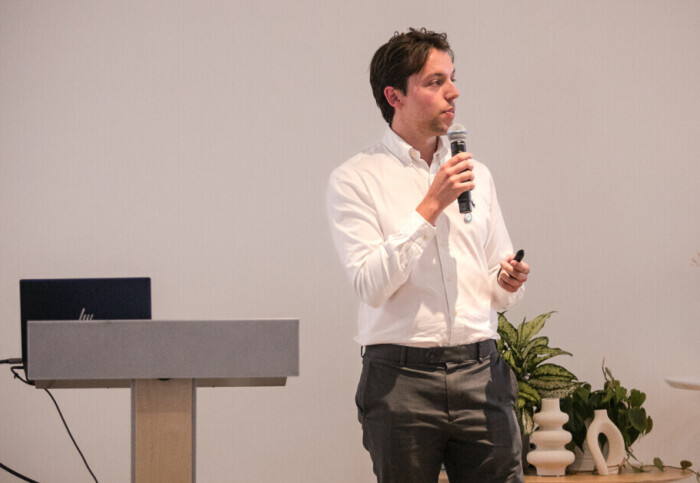
Max Munford of OSSTEC, one of the Imperial startups backed by ICEF, pitches the company in San Francisco.
A new fund has been launched to invest in companies founded by Imperial students, staff and alumni.
Imperial has launched a new round of the Imperial College Enterprise Fund (ICEF), which is raising funds from investors to support spinouts and startups with a strong connection to the College. The aim is to raise £2 million and more that can be used to support innovative early-stage startups with great commercial potential.
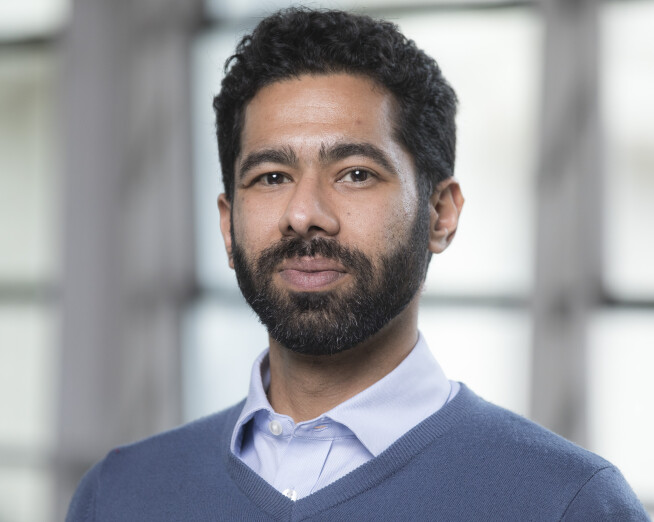
“Young companies can come to us, at any point in their planning, and say: we've got an idea and we need half a million pounds or a million pounds to implement it,” says Dr Brijesh Roy, Head of Startup Investment Funds at Imperial. He can then advise them on preparing their approach to investors, and present their case to the ICEF investment committee. “If the committee likes the idea, it can give them some of that money, and we can help them find the rest.”
This will be the third venture fund Imperial has created, building on the success of its first iteration in 2020 and its second in 2021. These raised £2 million and £1 million respectively, and have made a total of 11 investments to date. Crucially, the process of becoming investment-ready and the backing of ICEF has helped enable these companies collectively to raise £25 million in seed and later rounds from a variety of investors.
Young companies can come to us with an idea, and if the committee likes it, ICEF can give them some of the money they need, and we can help them find the rest. Dr Brijesh Roy Head of Startup Investment Funds, Imperial
Like its predecessors, ICEF 3 will take advantage of the Enterprise Investment Scheme (EIS), a government initiative that incentivises investment into high potential – but high-risk – technology-based businesses. Investors commonly seek out EIS opportunities through funds such as ICEF, which source suitable companies and provide management services.
Managing the fund and making final investment decisions is the job of Parkwalk, a venture capital management company that specialises in technology-based businesses. Building the pipeline of companies for investment is the job of the Startup Investments Team at Imperial, advised by the Imperial College Startup Investment Committee, a body packed with seasoned professionals from inside and outside the College.
 “We are pleased to launch the third fund with the team at Imperial College Enterprise, which has an innovative ecosystem of deep science and technology businesses,” said Martin Glen, Investment Director at Parkwalk. “With our expertise in scaling and commercialising early-stage university spinouts, and Imperial’s impressive global top-10 position in R&D, we are excited to be supporting the next wave of entrepreneurs.”
“We are pleased to launch the third fund with the team at Imperial College Enterprise, which has an innovative ecosystem of deep science and technology businesses,” said Martin Glen, Investment Director at Parkwalk. “With our expertise in scaling and commercialising early-stage university spinouts, and Imperial’s impressive global top-10 position in R&D, we are excited to be supporting the next wave of entrepreneurs.”
The role of the fund
Imperial’s venture funds step in at a key moment in a young company’s development. For a spinout company or student startup, initial work on the innovation may have been supported with grants, small private investments or even the founders’ own resources. But then the moment comes when more money is needed to take the project forward, or to pay for business development work that cannot be covered by grants. Then they have to look for outside funding.
We are excited to be supporting the next wave of entrepreneurs. Martin Glen Investment Director, Parkwalk
Preparing for investment is part of a wide range of support provided through Imperial’s ecosystem. In the Enterprise Lab, for example, students, staff and alumni can develop their entrepreneurial mindset, skills, and networks. There are places like Hackspace for hands-on idea development, competitions such as the Venture Catalyst Challenge and WE Innovate to provide motivation and funding, and accelerators such as Undaunted to firm-up business ideas. And when a startup or spinout needs a home, there is the White City Incubator.
Early coaching in how founders should address investors and frame their offer is part of the support available through the Enterprise Lab. This is taken to the next level when the fund gets involved.
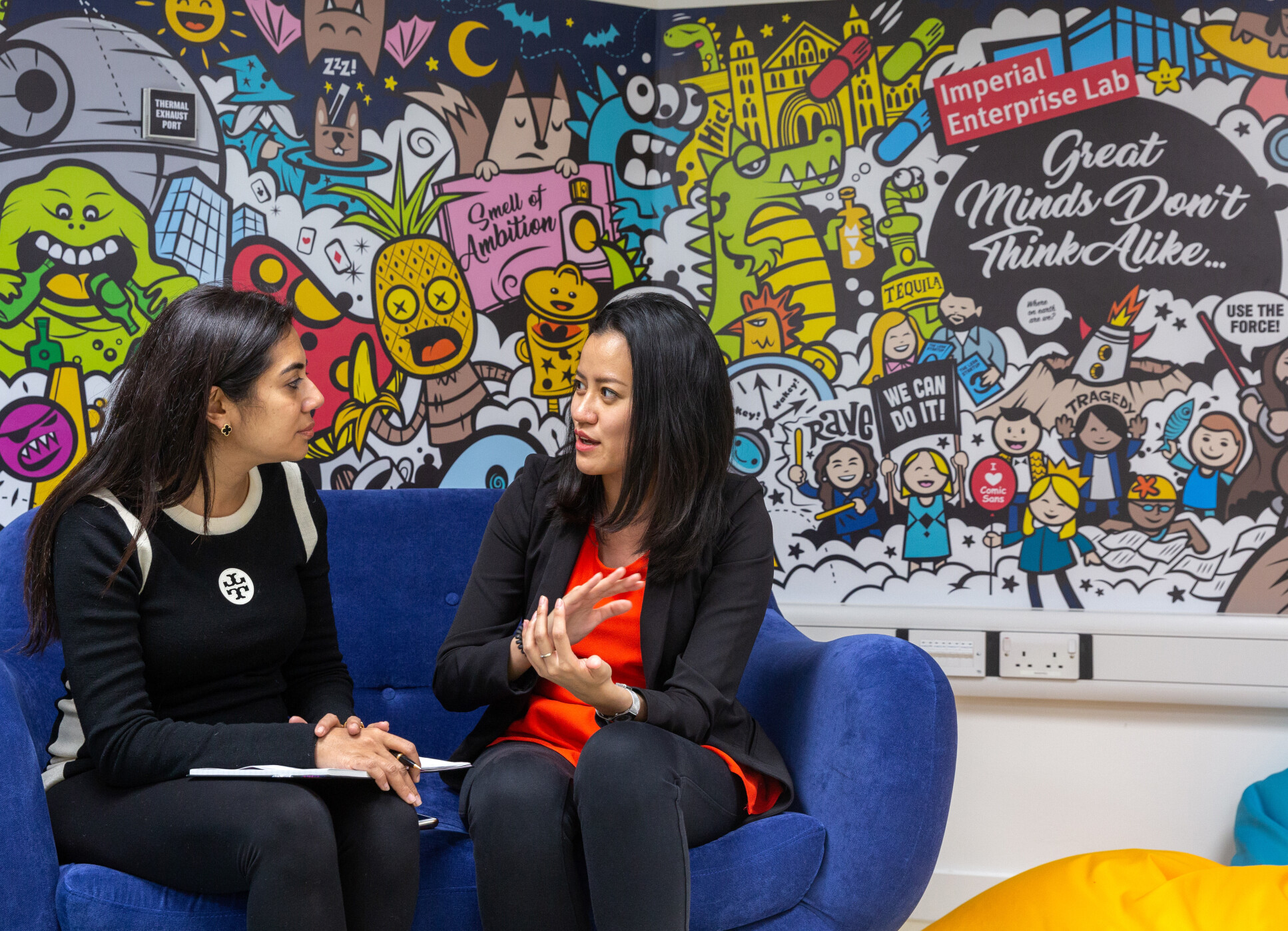
“I work with the team to get them ‘investment-ready’,” Dr Roy says. This will involve discussing how they put a value on the company, how much money they need to raise, and what they are prepared to offer in exchange. “Being investment-ready often involves thinking about how the investors are going to make money.”
Being investment-ready often involves thinking about how the investors are going to make money. Dr Brijesh Roy Head of Startup Investment Funds, Imperial
Where conversations with other investors might focus on the deal, the aim with ICEF is to build a dialogue. “We are here for them and they can keep coming back to us,” Dr Roy explains. “As a lead fund, we can say: we like what you’re doing, but we wouldn’t invest in this plan. However, we would invest in a plan to raise a bit more money or that was a bit more ambitious, for example.”
As this process goes forward, Dr Roy produces detailed investor research on each company’s potential. “They do the work with us, but then they're also investment ready for any other fund,” he says.
Taking a stake
The amount of money that ICEF can invest is tailored to this early stage in a company’s development. “Almost all university spinouts need about £1 million for their first 12-24 months,” Dr Roy explains. “Then they need £10 million for the next 12-24 months, and after that they need £100 million. Finally, they are acquired or go public for £1 billion. That's the journey that you want to go on. Our role is to do that first stage as quickly as possible.”
The ICEF will contribute around £250,000 to that first £1 million round. This has an important crowding-in effect, helping to build investor interest and draw in business angels, institutional investors and other venture funds who might be willing to complete the round. “Often we either write the biggest cheque, or the first cheque,” Dr Roy says.
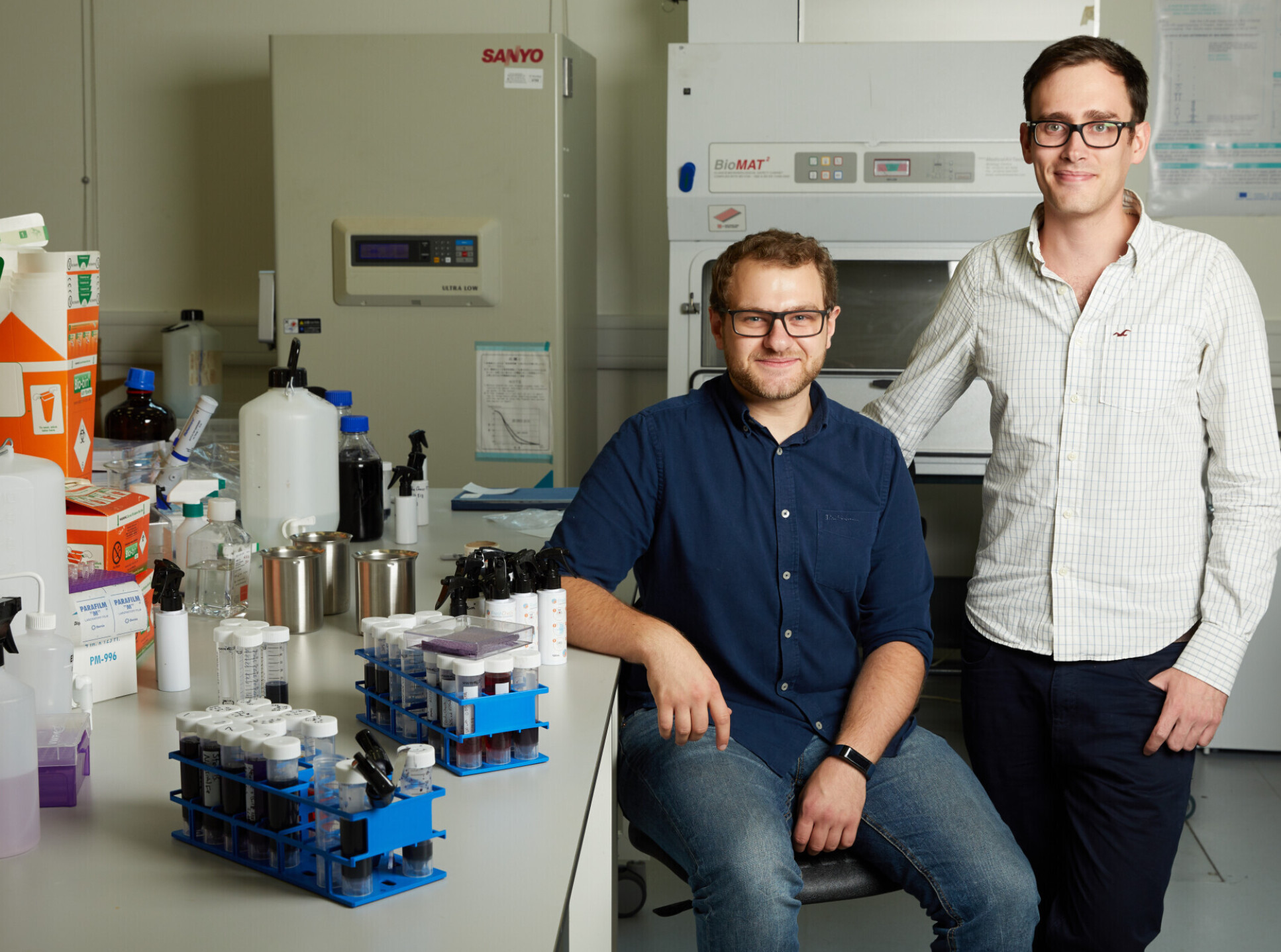
In return for this investment, the ICEF takes shares, or equity, in the company. This differs from the founding equity Imperial receives in spinout companies, which recognises its innovation ecosystem, leading research facilities and project funding” This differs from the founding equity Imperial receives in spinout companies, which recognises its innovation ecosystem, leading research facilities and project funding. “We don't take equity, we buy equity,” Dr Roy explains.
We expect the fund to get a return in five to seven years, but we also realise that it might take ten years or more. Dr Brijesh Roy Head of Startup Investment Funds, Imperial
And like any other investment fund, the ICEF is looking for a return on behalf of the people whose money it is placing. It is, however, a patient investor. “We are used to fitting in with university timelines,” Dr Roy says. “We expect the fund to get a return in five to seven years, but we also realise that it might take ten years or more.”
As well as being the first private backer of a spinout or startup, ICEF can also support young companies that have already secured investment, or make follow-on investments in teams that it has backed before. The overall aim is to get them to the next big funding round, typically a Series A round of £10 million. “And three of our companies have already gone on to raise a £10 million cheque, while a fourth has crossed the innovation ‘valley of death’ and been acquired by a major corporation,” Dr Roy says. These companies are Charco Neurotech, GripAble, Cheesecake, and Bonnet.
Creating momentum
Charco Neurotech was founded in 2019 by Lucy Jung, then a student on Imperial’s master’s programme in Innovation Design Engineering, and medical registrar Dr Floyd Pierres. They were inspired by the work of the 19th century neurologist Jean-Martin Charcot to develop a wearable device that produces vibrations that help manage the symptoms of Parkinson’s disease.
ICEF invested in us when we were in the development stage, and allowed us to get our product into the market. Lucy Jung CEO and co-founder, Charco Neurotech
“ICEF invested in us when we were in the development stage, getting the research done and the device prepared,” says Ms Jung, the company’s chief executive. The amount of money that Charco needed was relatively modest – ICEF I contributed £205,000 to a £600,000 funding round – but it still had a significant impact on the company’s progress. “It allowed us to get our product into the market.”
She also thinks it created investment momentum, helping Charco raise a further $10 million later in 2021, in a round led by Amadeus Capital Partners and Parkwalk. This money has supported further commercialisation of the device, development of a manufacturing line and expansion of the company’s team.
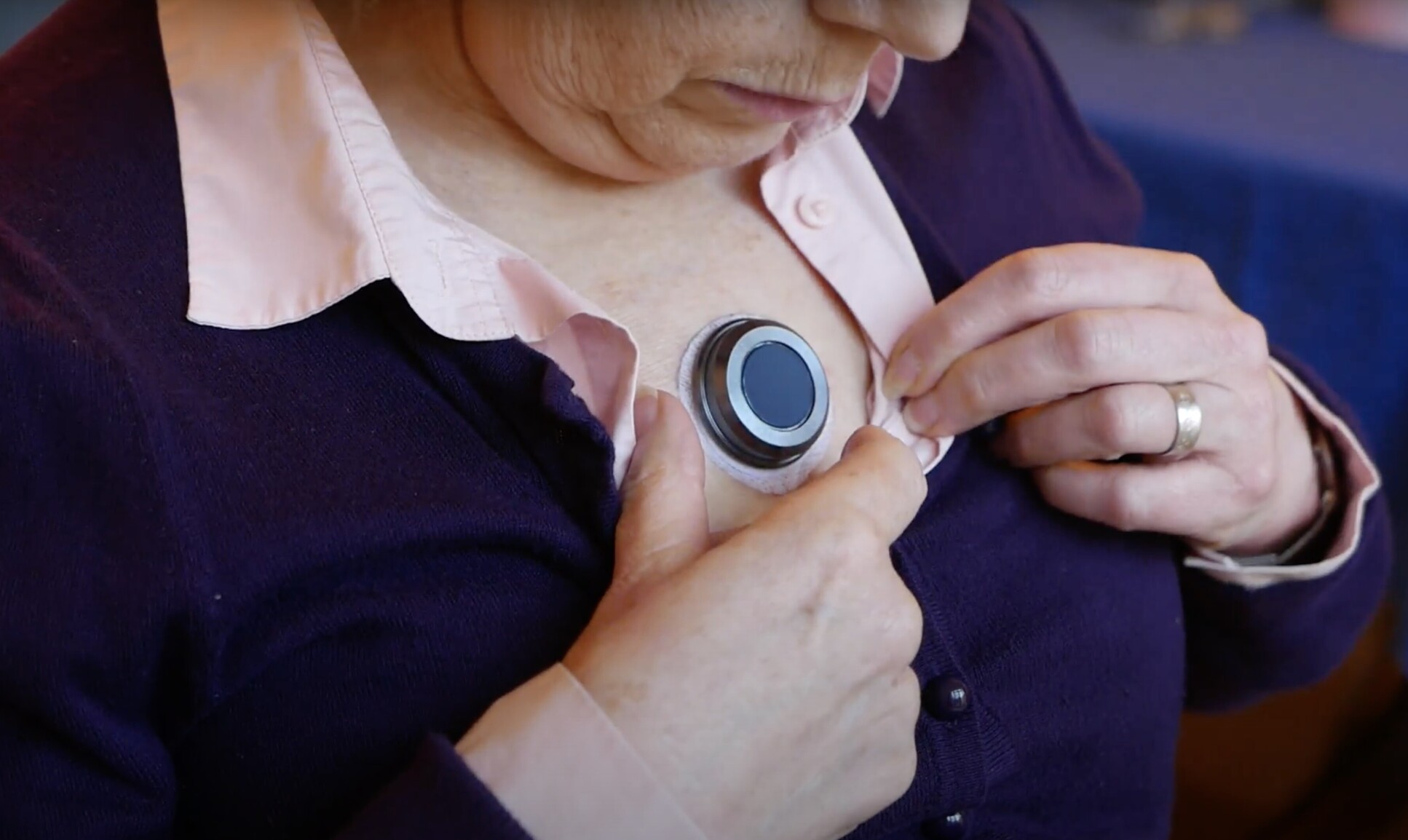
Dr Roy’s support played an important role in this process. “Brijesh gave us constant feedback on our presentation to investors, and that felt like a real collaboration,” says Ms Jung. “We were being educated in how to be investor-ready, and that also helped us to raise further funds.”

It also contributed to her own development as a company founder. “My background is in engineering and development, but going through this process with the ICEF helped me understand what investors are looking for and the kind of data they need to make a decision,” she says. “From then on, I became really interested in building and scaling a medical device company.”
She went on to take part in the Royal Academy of Engineering’s Shott Scale-Up Accelerator, which focuses on executive development, and then completed a management programme at the Harvard Business School. “So, I’ve learned a lot about building a company through this process, and that interest is sustained to the present day,” she says.
Decisive investment
GripAble was more developed as a company when it came to ICEF for support. It was formed in 2017 by researchers at Imperial and clinicians at Imperial College Healthcare NHS Trust to develop a digital assessment and training platform for individuals undergoing rehabilitation for neurological and musculoskeletal conditions.

By late 2020 the company had already raised nearly $2 million in seed funding, but was struggling to roll out its product during the turmoil of the Covid pandemic. “Support from ICEF played a significant part in getting us through an unbelievably challenging market entry phase,” says Dr Paul Rinne, co-founder and chief executive of the company. “Although the fund came in a little bit later than usual, it was backing an Imperial spinout that was doing well, doubling down on the university’s commitment to us. And that was fantastic.”
Brijesh and the Imperial fund are incredibly supportive, with a real understanding of the early stage of company development. Dr Paul Rinne Co-founder and chief executive, GripAble
ICEF 1 invested £250,000 in the company as part of a £1.1 million round in February 2021. According to Dr Rinne, the Imperial fund’s participation played an important part in making this round happen. “It’s not a random business angel or a venture capital fund no-one has heard of,” he says. “It’s Imperial, an institution with a track record and reputation that can be trusted, and that added weight to closing the round.”
Once again, this paved the way for a bigger round, and in 2022 GripAble secured £8.2 million from Parkwalk and IP Group. “We are very lucky with the investors we have, including Brijesh and the Imperial fund,” says Dr Rinne. “They are incredibly supportive, with a real understanding of the early stage of company development and of the environment we work in.”
GripAble’s platform is now deployed in 500 clinics across the UK, and work is underway to replicate this success in the USA. “We have 45 pilots with clinics in America, and are in the early stages of closing our first annual recurring revenue contracts with them,” says Dr Rinne. “When these come through, we can start raising our first US venture capital money for scaling up in the US.”
Alternative pathways
Other companies in the ICEF portfolio have grown through variations on this investment route. Cheesecake Energy was co-founded by Imperial alumnus Dr Michael Simpson to develop a green energy storage technology that works by converting electricity into compressed air and heat. ICEF 1 invested £300,000 in the company as part of a £1.1 million round in September 2021, which was followed by a £3.5 million investment led by the Business Growth Fund. After that, public funds stepped in, with the government’s Longer Duration Energy Storage Demonstration Competition providing a transformative grant worth £9.4 million.

Meanwhile, Bonnet was founded in 2021 by Imperial alumni Patrick Reich and Eliot Makabu to improve the experience of electric vehicle drivers with an app connecting charging networks and operators around the UK. ICEF 1 invested £300,000 in the company as part of £1 million round in August 2021, before the company went on to secure £5 million in a funding round led by Google Ventures in January 2022. In November 2023 it was acquired by OVO Energy, making Bonnet the first company supported by the ICEFs to exit. “So, Bonnet successfully transitioned the ‘valley of death’ from pre-seed financing to acquisition,” Dr Roy says.
We are creating a strong pipeline for large investment funds seeking to write £10 million cheques. Dr Brijesh Roy Head of Startup Investment Funds, Imperial
As Imperial builds its latest ICEF fund, it also has an eye on the future. “We are creating a strong pipeline for large investment funds seeking to write £10 million cheques,” Dr Roy explains. That includes some funds linked to other universities, such as Oxford Sciences Enterprise, and regional university funds such as Northern Gritstone and MindForge.
Joining them is an option that Imperial is keeping open. “Big university funds are now part of the ecosystem,” Dr Roy says, “and if we've done our work properly with ICEF 3, then we've got a raft of companies ready for investment if Imperial decides to create a big fund in the future.”
Article text (excluding photos or graphics) © Imperial College London.
Photos and graphics subject to third party copyright used with permission or © Imperial College London.
Reporter
Ian Mundell
Enterprise